Pivotal clinical trial results
FDA authorization is supported by the Mirai study, a clinical trial that demonstrated
improvements in MDD symptoms.1,2
MDD=major depressive disorder.
In the Mirai clinical trial of patients with MDD, when added to an ADT, Rejoyn
Reduced symptoms without side effects1
A landmark clinical trial1
The Mirai clinical trial evaluated the effectiveness and safety of Rejoyn as an adjunct to ADT in patients with MDD.1
194 patients Received Rejoyn, which included
Cognitive-Emotional Training1
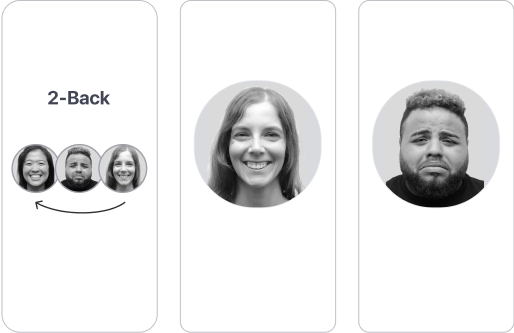
Rejoyn is a 6-week treatment that consists of1:
- Working memory tasks
- Identification of emotions
- CBT-based video lessons
Control
192 patients received a
Cognitive-Training Control1
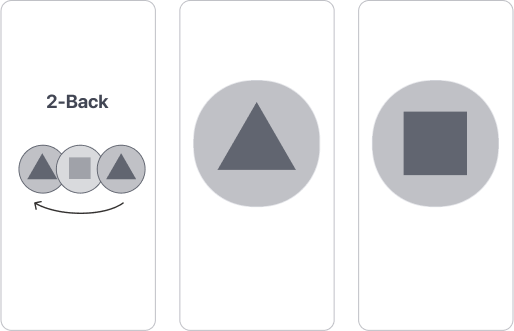
The control, or Sham, had a similar design and was matched for time and attention1:
- Working memory tasks
- Identification of shapes
- No CBT-based video lessons
ADT=antidepressant therapy; CBT=cognitive behavioral therapy.
Study design
The safety and effectiveness of Rejoyn were evaluated in a pivotal, multicenter, remote, double-blind, randomized, controlled trial in adults with MDD who were on ADT.1
The primary efficacy endpoint was the mean change from baseline to Week 6 in the MADRS total score for Rejoyn vs the Cognitive-Training Control.1
MADRS=Montgomery-Asberg Depression Rating Scale.
Efficacy endpoints were assessed in mITT and ITT analysis sets1
ITT
All patients enrolled and randomized
Rejoyn (n=194)
Sham (n=192)
mITT
- Defined as full analysis set (FAS) in protocol and used for the primary efficacy endpoint analysis
- Patients with 1 session with either treatment
- Assessments of MADRS total score at baseline
- Assessments of MADRS total score at ≥1 post-baseline timepoint
Rejoyn (n=177)
Sham (n=177)
ITT=intention-to-treat; LS=least squares; mITT=modified intention-to-treat.
Rejoyn was evaluated using the following scales:
Reduced depression symptoms (MADRS)1,5
The Montgomery-Asberg Depression Rating Scale (MADRS) is a clinician-rated measure of depression severity commonly used in clinical trials, ranging from 0 to 60.1,5
ITT: Mean MADRS score reduced from 28.4 at baseline to 19.1 at Week 6 in the Rejoyn group (n=194), compared with 28.5 to 21.3 in the Sham group (n=192).1,6
Change in MADRS Total Score From Baseline to Week 61,5,6
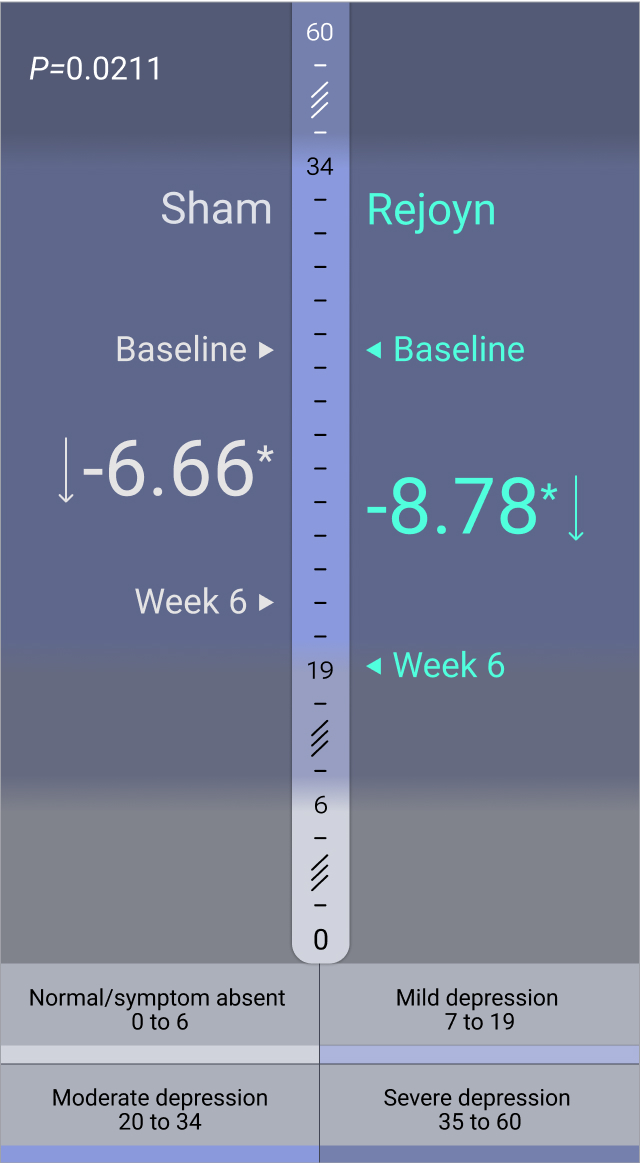
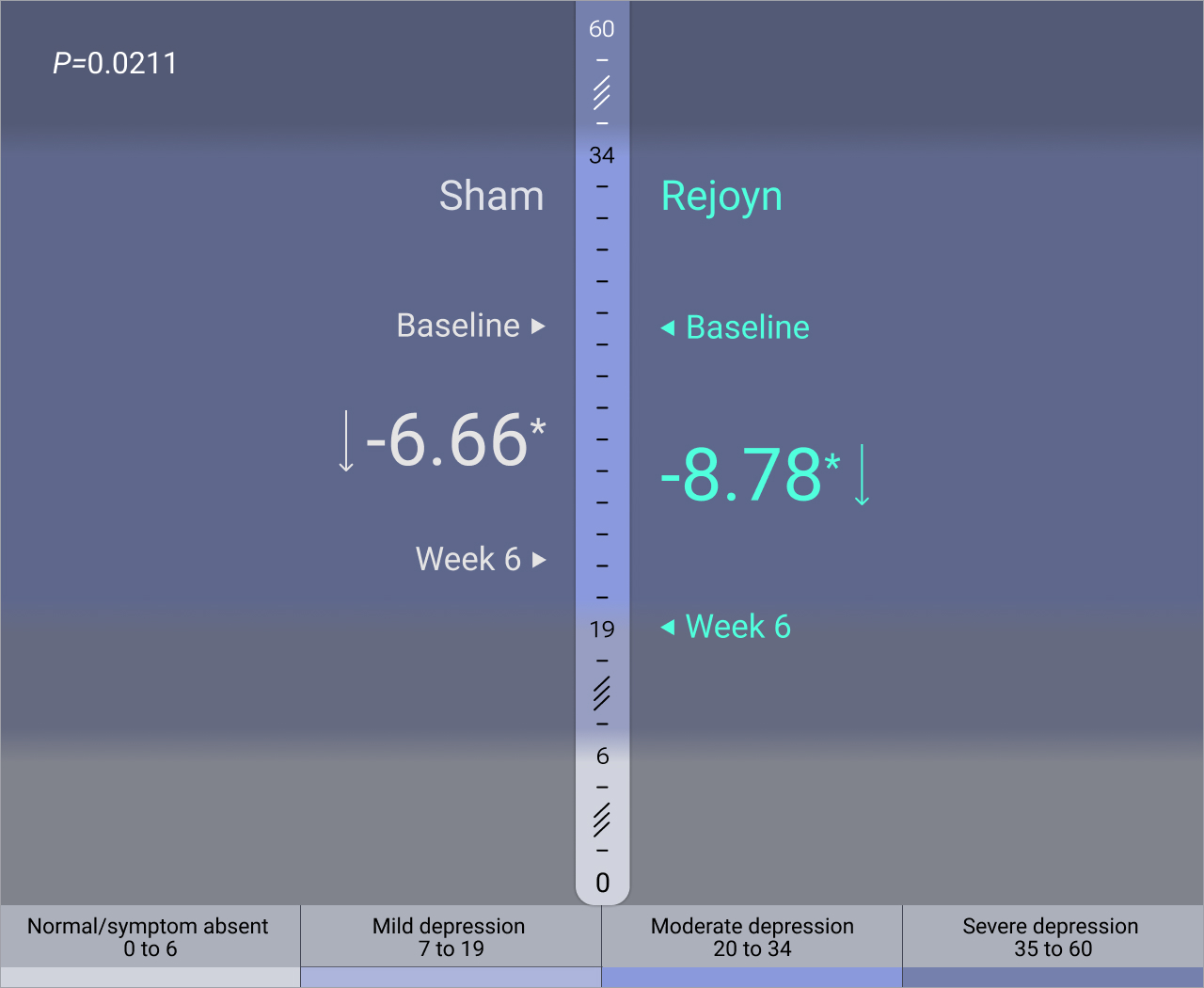
Reduced depression symptoms (MADRS)1,5
The Montgomery-Asberg Depression Rating Scale (MADRS) is a clinician-rated measure of depression severity commonly used in clinical trials, ranging from 0 to 60.1,5
mITT: Mean MADRS score reduced from 28.5 at baseline to 19.2 at Week 6 in the Rejoyn group (n=176), compared with 28.4 to 21.0 in the Sham group (n=176).1,6
Primary endpoint: Change in MADRS Total Score From Baseline to Week 61,5,6
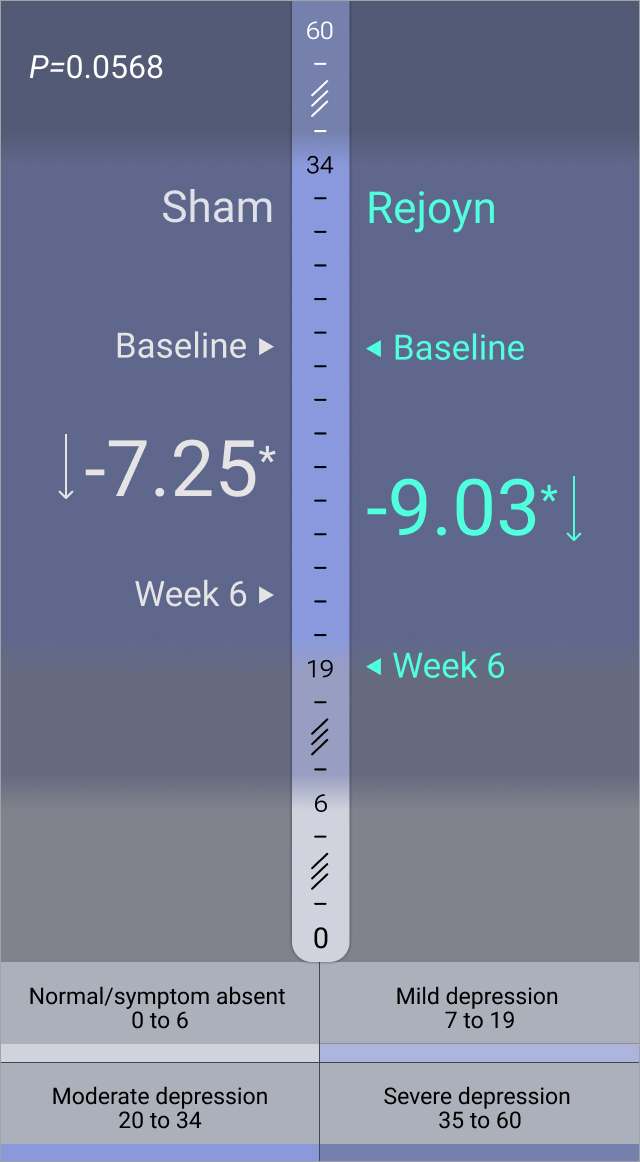
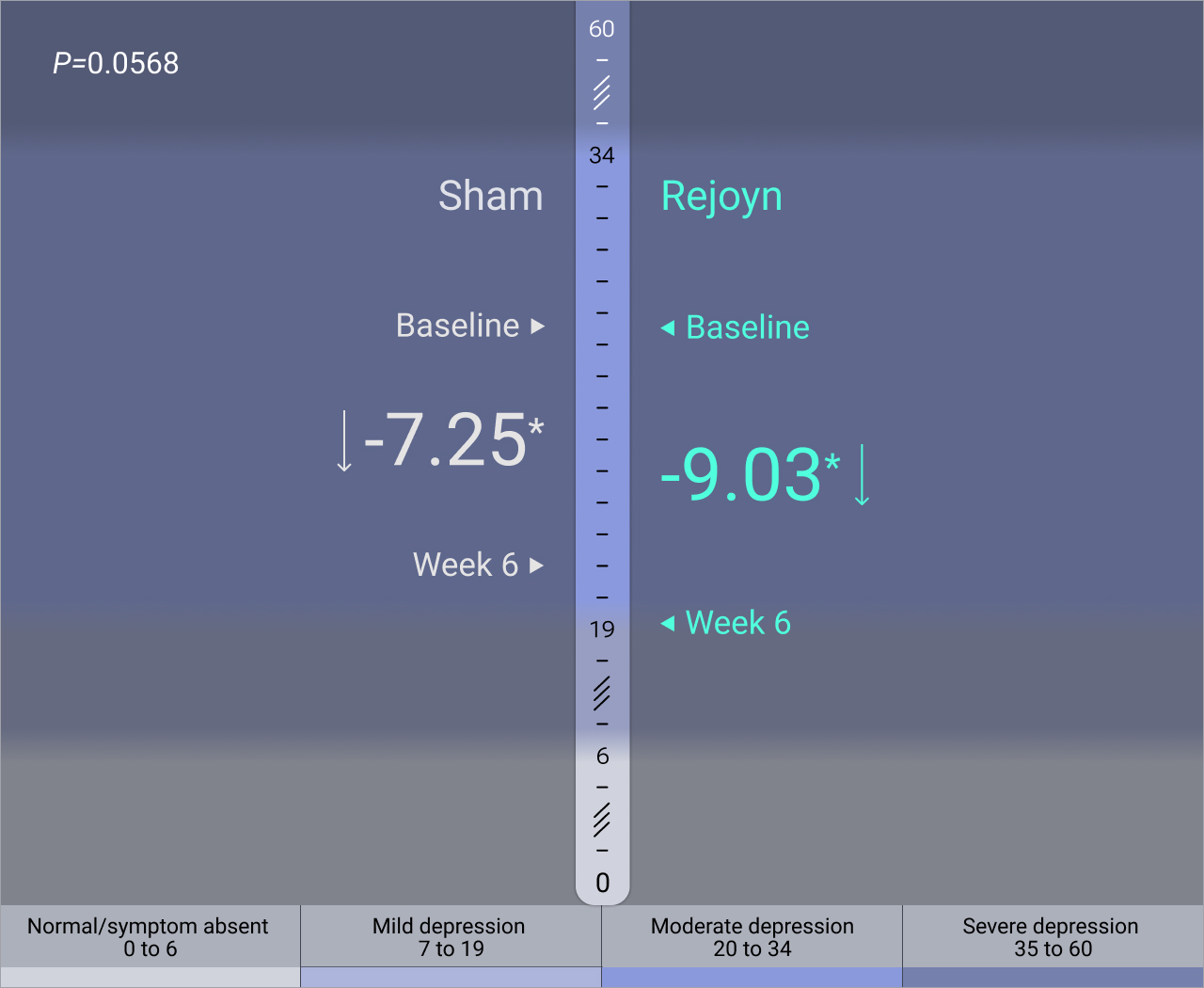
Meaningfully reduced depression severity from moderately severe to mild (PHQ-9) 1,7†
ITT: Mean PHQ-9 score reduced from 15.4 at baseline to 8.4 at Week 6 in the Rejoyn group (n=194), compared with 15.2 to 10.1 in the Sham group (n=192).1,6
Change in PHQ-9 Score From Baseline to Week 61,6,7
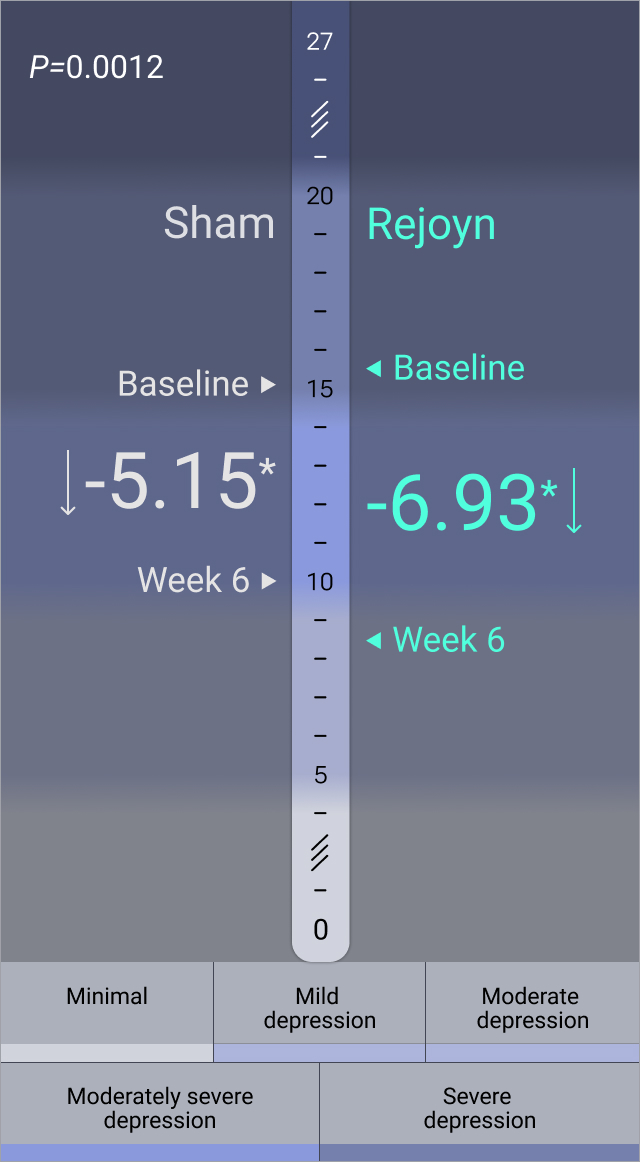
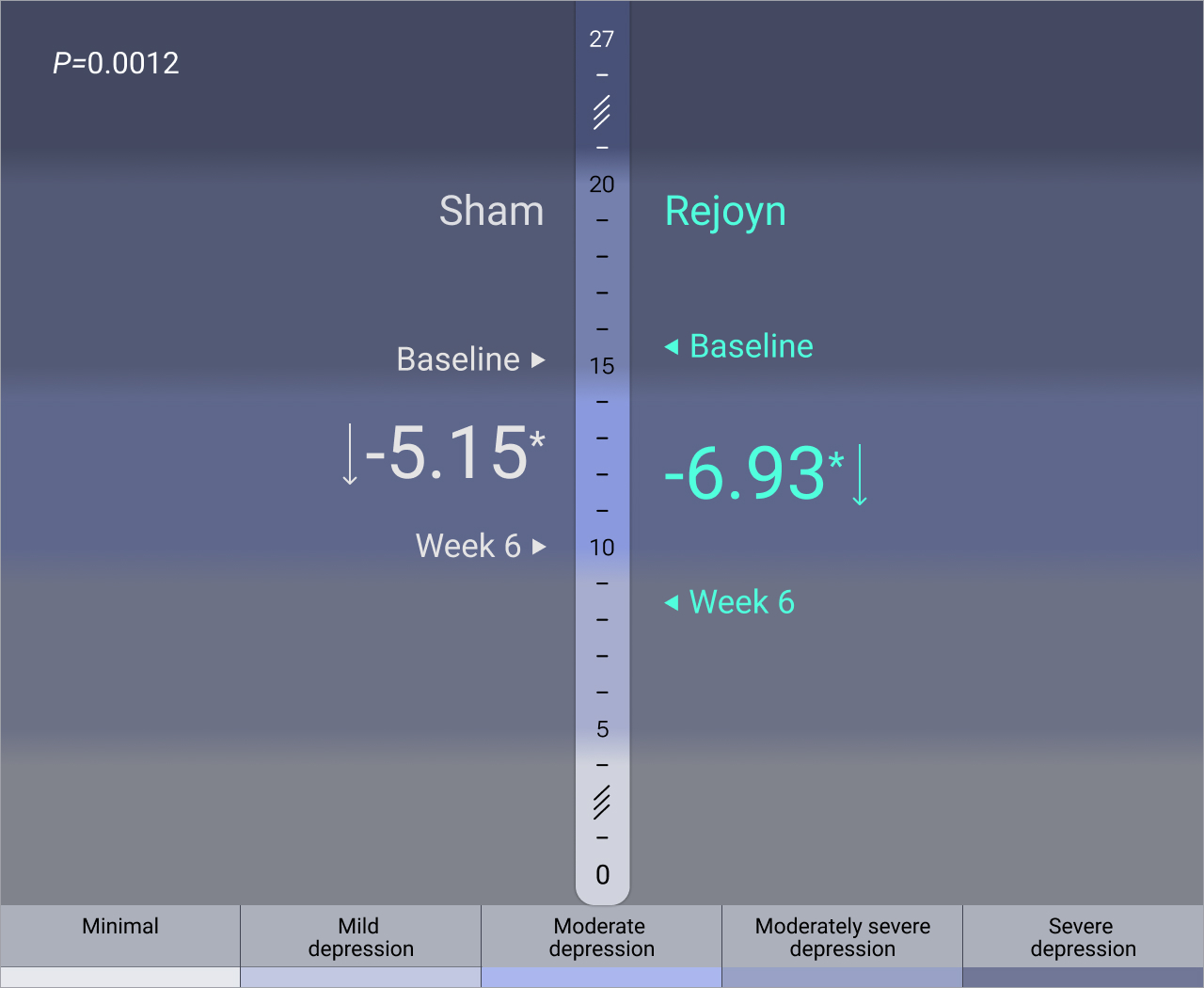
Meaningfully reduced depression severity from moderately severe to mild (PHQ-9) 1,7†
mITT: Mean PHQ-9 score reduced from 15.3 at baseline to 8.4 at Week 6 in the Rejoyn group (n=167), compared with 15.1 to 10.0 in the Sham group (n=164).1,6
Change in PHQ-9 Score From Baseline to Week 61,6,7
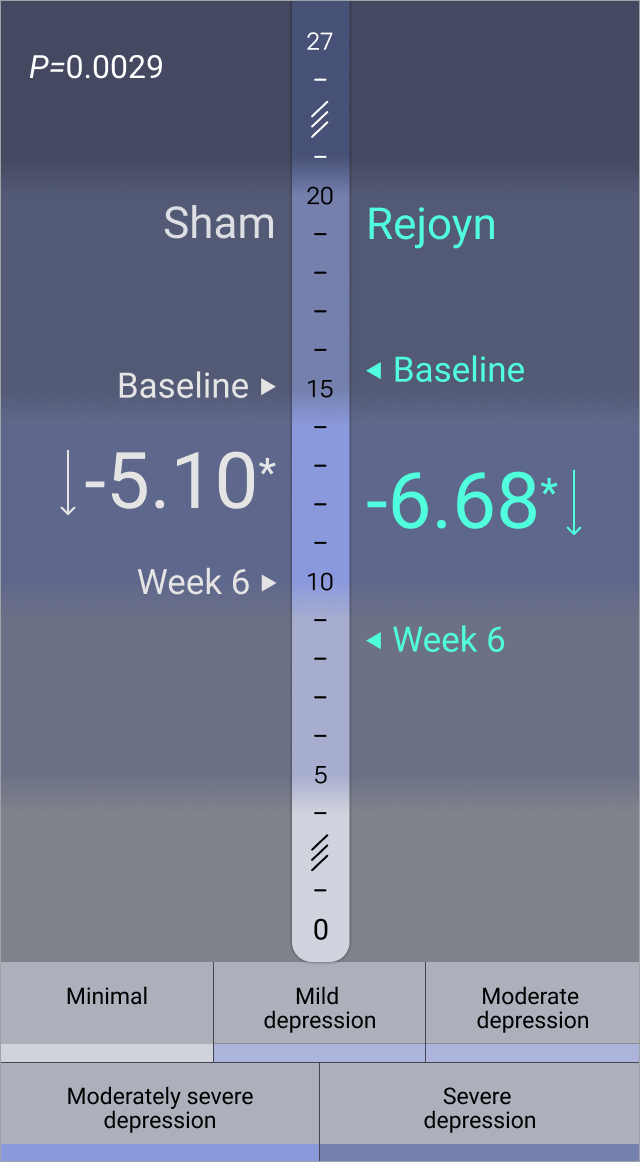
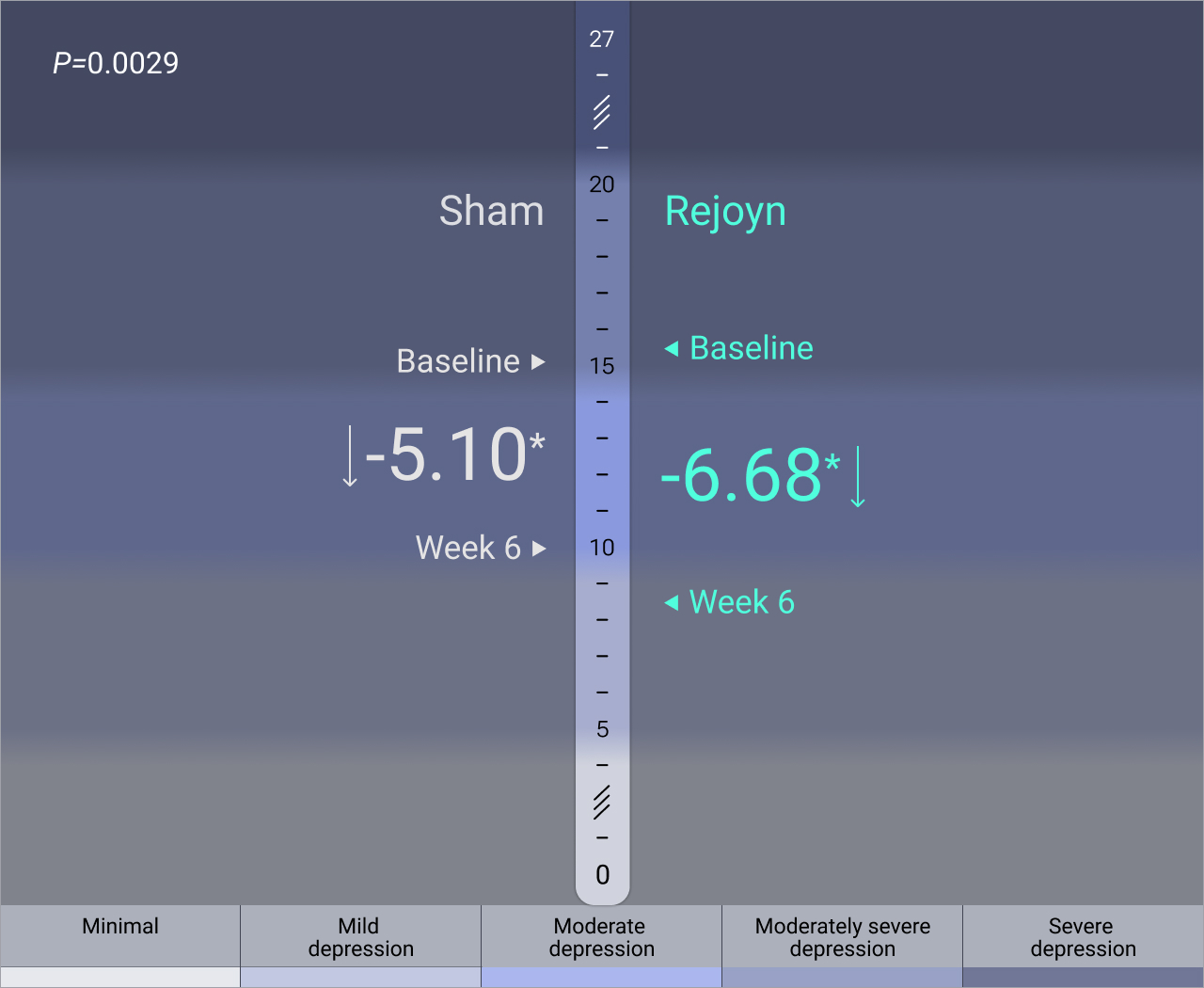
Meaningfully reduced depression severity from moderately ill to mildly ill (CGI-S)1,8†
ITT: Mean CGI-S score reduced from 4.3 at baseline to 3.2 at Week 6 in the Rejoyn group (n=194), compared with 4.3 to 3.5 in the Sham group (n=192).1,6
Change in CGI-S Score From Baseline to Week 61,6,8
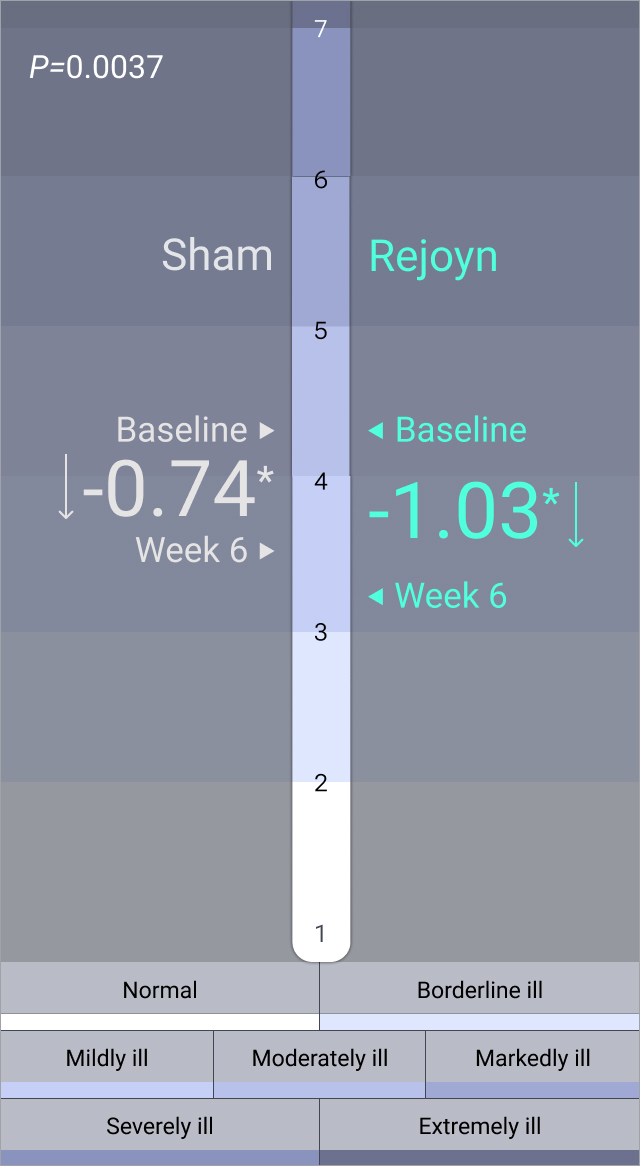
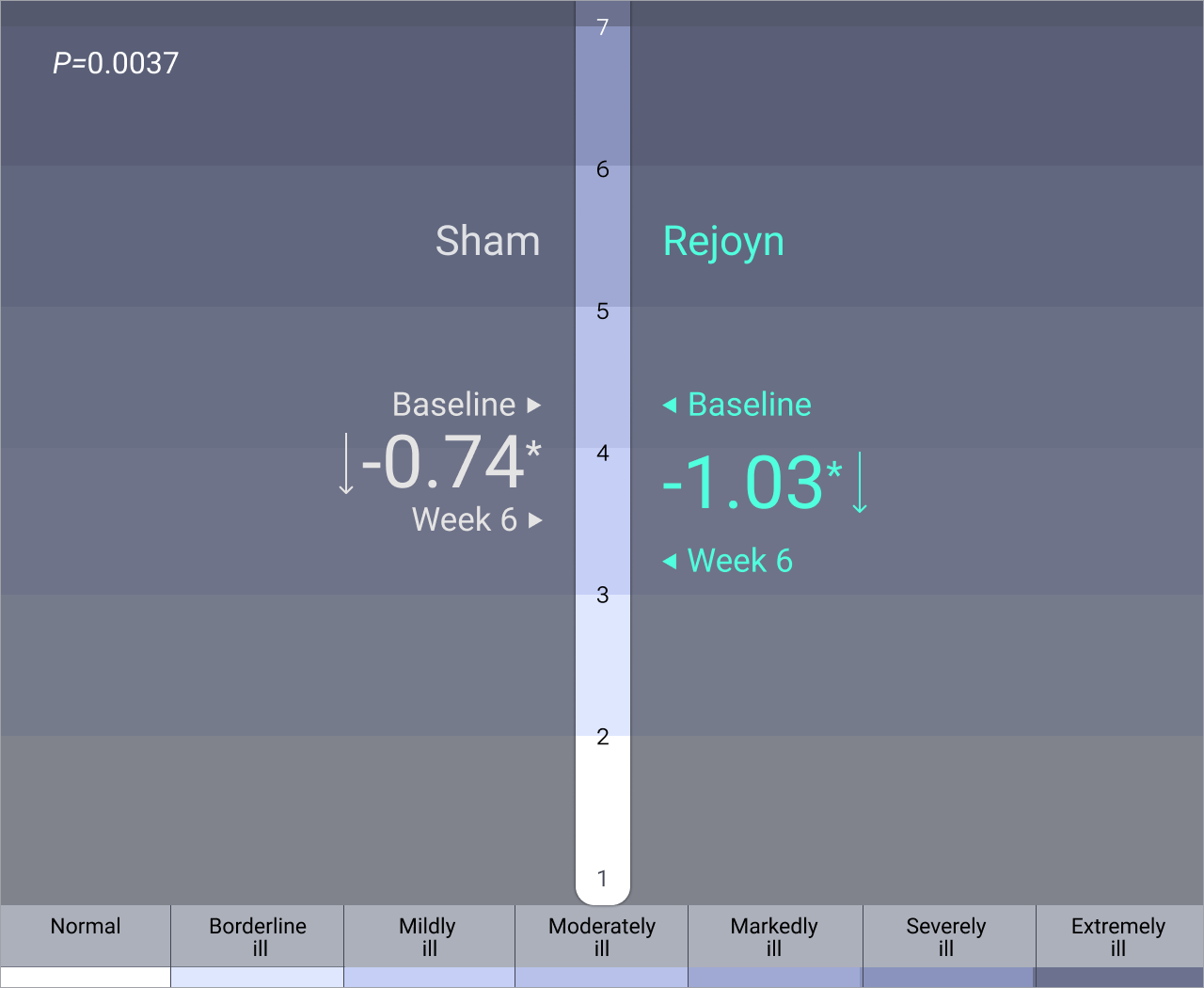
Meaningfully reduced depression severity from moderately ill to mildly ill (CGI-S)1,8†
mITT: Mean CGI-S score reduced from 4.3 at baseline to 3.2 at Week 6 in the Rejoyn group (n=175), compared with 4.3 to 3.5 in the Sham group (n=175).1,6
Change in CGI-S Score From Baseline to Week 61,6,8
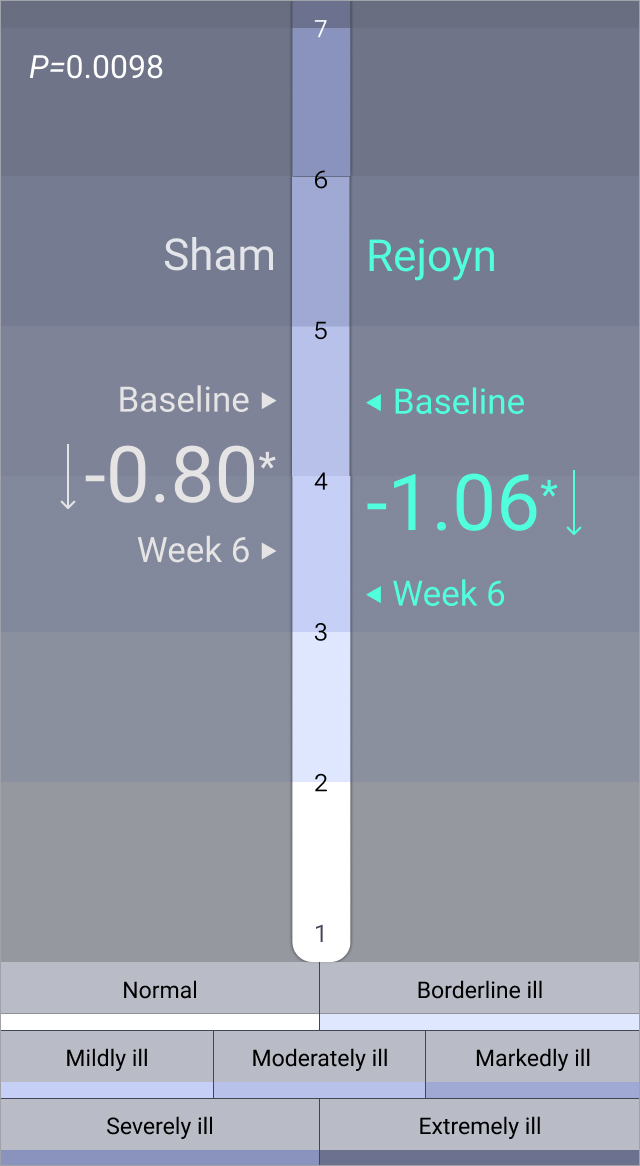
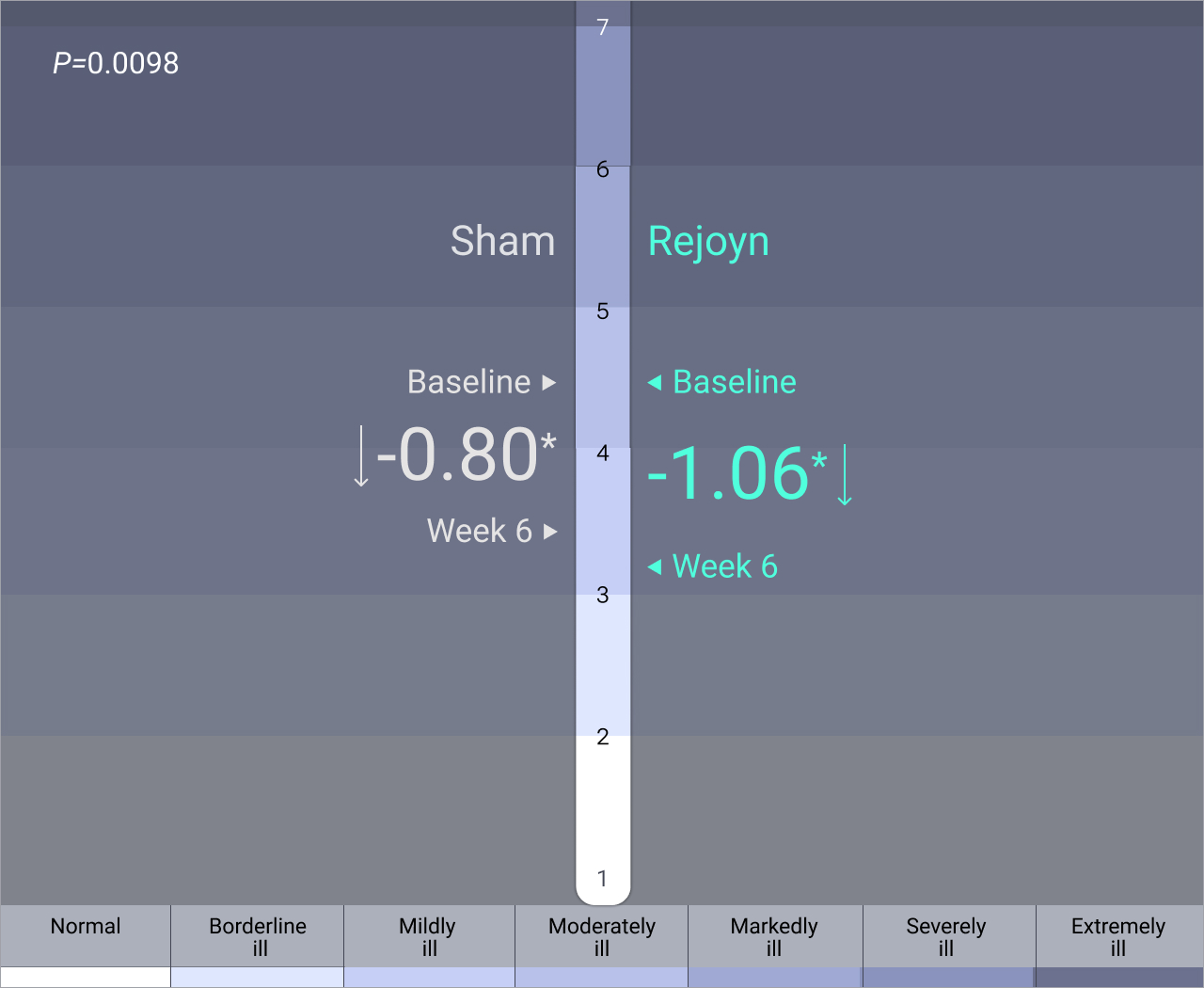
*Change from baseline represents LS mean change from statistical model.1
*Change from baseline represents LS mean change from statistical model.1
†Sham meaningfully reduced depression severity from moderately severe to moderate.1
PHQ-9=Patient Health Questionnaire 9.
*Change from baseline represents LS mean change from statistical model.1
†A change ≥1 is clinically meaningful.8
CGI-S=Clinical Global Impressions-Severity Scale.
The efficacy results for ITT and mITT were consistent across patient and clinician-rated scales.1
-
Full or partial response
51.3%of patients using Rejoyn experienced a full or partial response at Week 6 vs 38.7% of patients using Sham1
Full or partial response is defined as ≥30% MADRS reduction from baseline at Week 61
ITT population. P=0.0191.
-
Remission
18.2%of patients using Rejoyn experienced remission at Week 6 vs 13.0% of patients using Sham1
Remission is defined as ≥50% MADRS reduction from baseline and MADRS ≤10 at Week 61
ITT population. P=0.1934.
-
Rate of adherence
88.1%of people using Rejoyn adhered to treatment in the clinical trial, defined as completing at least 12 of the 18 treatment sessions.1
-
Patient satisfaction
76%of people using Rejoyn reported that they were “extremely satisfied” (37.1%) or “satisfied” (38.9%) with the experience.1
-
Durability of effect
Improved MDD symptoms in patients with moderate or higher anxiety1
Rejoyn was shown to improve MDD symptoms in patients with moderate or higher anxiety symptoms at baseline (GAD-7 score of ≥10) compared to Sham (MADRS reduction: -9.01 points vs -5.39 points; P=0.0099).1
GAD-7=Generalized Anxiety Disorder-7.
Zero adverse events related to Rejoyn1
Rejoyn is an app, so it has a different adverse event profile than medications. In a clinical trial, no adverse events were assessed as related to Rejoyn.1
| TEAEs1 | Rejoyn (n=187) |
Control (n=186) |
|---|---|---|
| Upper respiratory tract infection | 1.1% (n=2) |
3.2% (n=6) |
| Nasopharyngitis | 1.1% (n=2) |
2.7% (n=5) |
| Headache | 2.1% (n=4) |
1.6% (n=3) |
During the treatment period, one subject in the Rejoyn group experienced worsening depressive symptoms (based on predefined protocol criteria). In the Rejoyn group, 3.21% (n=6) of subjects reported clinically important suicidality (based on predefined protocol criteria), compared to 4.84% (n=9) of subjects in the Sham group. During the extension period, 0.53% (n=1) of subjects in the Rejoyn group and 1.08% (n=2) of subjects in the Sham group had clinically important suicidality.1
TEAE=treatment-emergent adverse event.
Join us for a peer-led virtual program
In this video, an expert psychiatrist will discuss an advancement in the adjunctive treatment of major depressive disorder (MDD)—Rejoyn, the first FDA-authorized prescription digital therapeutic designed specifically to reduce symptoms of MDD through a smartphone app. By watching this video, you will:
- Hear an overview of the epidemiology of MDD and the challenges of living with MDD
- Gain insights into the need for treatments that may address neural dysfunction in MDD
- Discover the hypothesized mechanism of action of Rejoyn
- Explore the clinical data on the efficacy and safety of Rejoyn
- Learn how to prescribe Rejoyn and how Rejoyn can be integrated into current treatment practices for patients with depression who are on antidepressant medication
Talk to an Otsuka Medical Science Liaison (MSL)
An MSL can provide additional information and answer questions you may have about Rejoyn.
Mark Thomas




Is Rejoyn right for your patients?
Learn more about Rejoyn and if it could be a good fit for your patients.